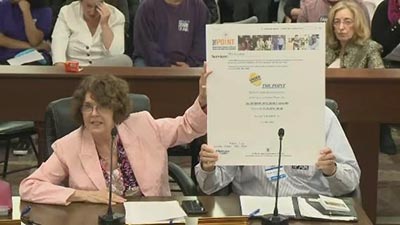Special Legislative Update

Maureen testifying on June 7 before House Finance Comm. to support H5252 to strengthen state Aging & Disability Resource Center(the Point). Rep. Carson, bill sponsor, is at upper right. Poster shows Point website “Under Construction”.
Building an Age-Friendly Rhode Island requires advocacy on many levels – with members of Congress, the state legislature and executive branches, municipal leaders, businesses and importantly, those who will benefit from age-friendly activities. While our focus is on making our state more age-friendly for older persons, age-friendly initiatives also benefit persons in all age groups and those with differing abilities. For example, making sure sidewalks are passable and free of dangerous cracks is good for those who use canes, walkers and wheelchairs and those pushing strollers.
What do we mean when we ask you to become an advocate? Merriam-Webster defines advocacy as “the act or process of supporting a cause or proposal: the act or process of advocating.” Dicitonary.com defines it as “the act of pleading for, supporting, or recommending.” Advocating for an Age-Friendly RI takes place in many arenas. One important one is with the state legislature. Many recommendations in our Strategic Plan involve policy changes needing legislative action. Toward that end, many pieces of legislation (referred to as bills) were introduced in the 2017 general assembly. In my role as Chair of the Aging in Community Subcommittee, I engaged several legislators in bcoming age-friendly champions, assisted with developing legislative language, met with key members of the legislature and collaborated with many of our partners to provide supportive statements at legislative hearings. A list of these bills with brief descriptions appears at the end of this article.
Many bills supportive of our Age-Friendly Rhode Island Strategic Plan recommendations required additional funding in the state budget. Unfortunately, when state revenue projections fell short in May, we were advised by bill sponsors that the opportunity for passing bills requiring additional funding was extremely limited. There is some good news to report, however. The message of Aging in Community and age-friendliness was starting to be heard by many legislators and we developed some important legislative champions to help spread the word. And the general assembly listened to the voices of the many persons with disabilities and older persons who pleaded at hearings to reinstate the RIPTA No-Fare buss pass program resulting in passage of H5241A which provides at least $5 million in each of the next two years to continue the No-Fare bus ride program. Continuing the No-Fare bus pass program was a recommended strategy under our Transportation domain. Kudos to the Senior Agenda Coalition, the RI Organizing Project and the many others who worked so hard over the last two years to see make this happen.
As of the writing of this, the 2017 general assembly session ended in a standoff with no budget for fiscal year 2018 enacted and many bills that passed one branch failing to receive final action. A Senate resolution, S992 by Sen. Goodwin, did pass on the final day. It requests the Executive Office of Health and Human Services to utilize funding available under law to develop the RI Aging and Disability Resource Center (ADRC) and to convene a stakeholder group on long term care rebalancing reform. Currently no state funding supports our ADRC and it lacks a website to provide interested persons with timely, accurate information on programs and services. This has been an outstanding need for many years as has been the need to move faster to rebalance our long -term care system. Passage of the resolution will hopefully lead to action.
There are many ways you can be an age-friendly advocate or champion? You can learn about pending age-friendly legislation and contact your local legislators to ask for their support. You can work at the local level to form an age-friendly task force to start to assess the age-friendliness of your city, town or neighborhood. You could suggest to businesses you frequent small ways they could become more age-friendly.
Age Friendly RI will continue to promote legislation to support our state’s older adults. Future newsletters and our website will provide more information and tools, so stay tuned.
2017 Legislation Supportive of Age-Friendly RI Recommended Strategies
- Reinstate No-Fare Bus Pass program (H5241A by Rep. O’Brien). Note: Several bills were introduced. This is the one that passed
- Strengthen state Aging and Disability Resource Center to include development of website (H5252 by Rep. Carson & S270 by Sen. Goodwin)
- Create population-based funding formula for local senior centers and senior programs (H5251 by Rep. Ruggeiro and S209 by Sen. DiPalma)
- Expansion of Medicare Premium Savings Program (H5738 by Rep. Ajello & S271 by Sen. Lynch Prata). Increased income to 185% Poverty level and eliminate asset test
- Increase in Medicaid Income Eligibility for Persons 65+ to 133% of Poverty level to be consistent with other Medicaid populations (H5843 by Rep. Tanzi & S748 by Sen. Calkin)
- Increase Maximum Credit from $340 to $750 for state Property Tax Relief program (H5458 by Rep. Ruggeiro & S476 by Sen. Lynch Prata)
- Expansion of Lifeline Telephone program to persons in DEA co-pay program (H5838 by Rep. Tanzi & S728 by Sen. Calkin)
- Liveable Home Tax Credit bill providing state tax credits for home modifications or purchase of home with accessible features (H5778 by Rep. McNamara &S477 by Sen. Felag)
- Expand the Temporary Caregiver Insurance program from 4 to 6 weeks (H5894 by Rep. Maldonado & Sen. Goldin)
- Provide for Nurse Delegation of certain tasks in home care settings (S499 by Sen. DiPalma)
